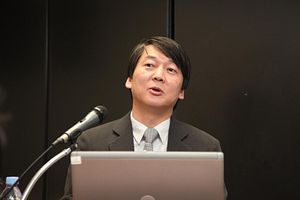In the 27 years since South Korea’s democratic transition, the public has rarely rewarded the ruling party at the mid-term polls. The Saenuri Party certainly faced difficult odds stepping into the by-elections on July 30 after scandals involving several cabinet nominees diminished President Park Geun-hye’s approval ratings. Despite these burdens, the conservatives pulled off a stunning victory, taking 11 out of 15 contested National Assembly seats and securing a firm majority in the unicameral legislature.
Meanwhile, the election results have left the New Politics Alliance for Democracy (NPAD) devastated. Not only were long-time party members defeated in critical electoral battlegrounds surrounding Seoul, but the party was also defeated on its own home turf in South Jeolla province where Saenuri candidate Lee Jeong-hyeon made history by becoming the first ever conservative assemblymen to represent any constituency in the province.
Taking responsibility for this catastrophe, most of the liberal opposition’s leaders have resigned, leaving the party to meditate on its failures and to build a better platform for the upcoming National Assembly election in 2016 and the presidential election in 2017.
So where did the NPAD go wrong?
Many point to the party’s weak leadership as the root cause of the defeat. In particular, former NPAD co-chairman Ahn Cheol-soo was singled out for criticism. The former physician, computer programmer, and businessman came into national prominence when he was considered for the Seoul mayoral election in 2011 and the presidential election in 2012. Although Ahn ultimately opted not to run in either election, his popularity was sustained by his promise of pursuing “new politics.” Ahn’s ideals and rhetoric contributed to the founding of the NPAD in March 2014 and his co-chairmanship of the new party was celebrated in many liberal circles.
However, as a leader of the opposition, Ahn proved to be inexperienced and failed to live up to the public’s high expectations. Despite the government’s mishandling of the Sewol ferry disaster becoming NPAD’s key issue during the June local elections and the July by-election, Ahn was largely silent on the issue in the days following the ship’s sinking. Ahn was also conspicuously silent on other key socio-political issues. Even though the liberals had largely opposed the conservative administration’s unilateral pursuit of free trade agreements (FTA) during President Lee Myung-bak’s term, Ahn failed to rally the party to deliver a coherent position on President Park’s decision to conclude negotiations with Beijing for a bilateral FTA by the end of the year. By July, the public had lost confidence in the “new politics” message.
Taking responsibility for the by-election defeat, Ahn has resigned and the oppositparty is expected to elect a new leader sometime between January and March of 2015 during its national convention. So will a more capable leader lead the NPAD towards a better future?
Kim Byeong-jun, a former Blue House policy director during the liberal Roh Moo-hyun administration, does not believe so. Kim noted in an interview that the opposition relies too heavily on regional loyalties and its “packaging” as a liberal party without presenting any viable policy recommendations or a vision for South Korea’s future. Indeed, the party’s lackluster political momentum does appear to be more deep rooted than its insipid leadership.
Since 2000, liberal national assemblymen have established and dissolved seven parties. As a consequence, the NPAD is a disorderly coalition of several factions all competing against one another. This internal strife manifested itself during the by-election campaign through a very public dispute over who would stand in the elections.
Overall, factionalism within the party is symptomatic of a larger problem confronting South Korea’s liberal movement. With the restoration of popular elections in 1987, liberals became a real contender for political power. However, the absence of the authoritarian regime robbed the movement of its unifying force, and politicians leading successive liberal parties were unable to consolidate its members around a concrete objective or vision. Without a united platform addressing key socio-economic and political issues, the NPAD has fallen back on the image of the party’s “struggle” against the conservative presidential administration, as though the liberals were still fighting against the repressive Park Chung-hee and Chun Doo-hwan dictatorships. This strategy was evident in the party’s politicization of the Sewol ferry disaster – and it has obviously not yielded success at the polls.
This defeat does offer an opportunity for the party to start anew. The conservatives were in the same position in 2002 after losing two successive presidential elections to the liberals – and the Grand National Party and its successor Saenuri Party were prompted to rebuild their platform and rally around the promise of economic growth. The conservatives then went on to dominate both the Blue House and the National Assembly after the 2007 presidential and 2008 legislative elections.
No doubt, the NPAD now faces a similar impetus to make the difficult changes required to win the public’s confidence and restore faith in the party’s ability to lead the country.































